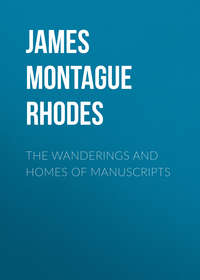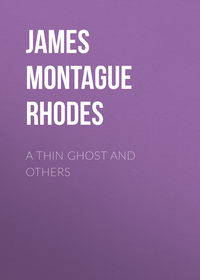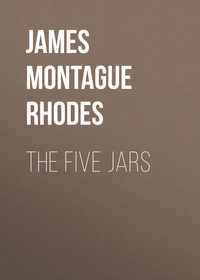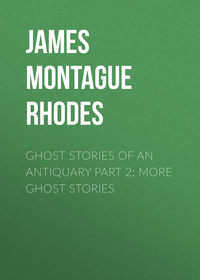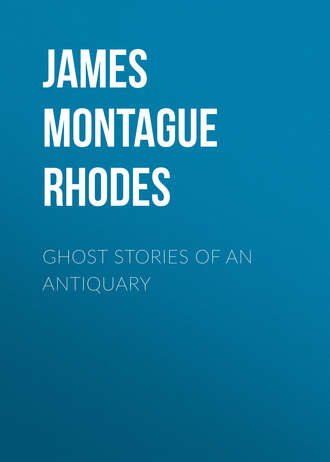 полная версия
полная версияGhost Stories of an Antiquary
'Ah,' he said, 'Count Magnus, there you are. I should dearly like to see you.'
'Like many solitary men,' he writes, 'I have a habit of talking to myself aloud; and, unlike some of the Greek and Latin particles, I do not expect an answer. Certainly, and perhaps fortunately in this case, there was neither voice nor any that regarded: only the woman who, I suppose, was cleaning up the church, dropped some metallic object on the floor, whose clang startled me. Count Magnus, I think, sleeps sound enough.'
That same evening the landlord of the inn, who had heard Mr Wraxall say that he wished to see the clerk or deacon (as he would be called in Sweden) of the parish, introduced him to that official in the inn parlour. A visit to the De la Gardie tomb-house was soon arranged for the next day, and a little general conversation ensued.
Mr Wraxall, remembering that one function of Scandinavian deacons is to teach candidates for Confirmation, thought he would refresh his own memory on a Biblical point.
'Can you tell me,' he said, 'anything about Chorazin?'
The deacon seemed startled, but readily reminded him how that village had once been denounced.
'To be sure,' said Mr Wraxall; 'it is, I suppose, quite a ruin now?'
'So I expect,' replied the deacon. 'I have heard some of our old priests say that Antichrist is to be born there; and there are tales—'
'Ah! what tales are those?' Mr Wraxall put in.
'Tales, I was going to say, which I have forgotten,' said the deacon; and soon after that he said good night.
The landlord was now alone, and at Mr Wraxall's mercy; and that inquirer was not inclined to spare him.
'Herr Nielsen,' he said, 'I have found out something about the Black Pilgrimage. You may as well tell me what you know. What did the Count bring back with him?'
Swedes are habitually slow, perhaps, in answering, or perhaps the landlord was an exception. I am not sure; but Mr Wraxall notes that the landlord spent at least one minute in looking at him before he said anything at all. Then he came close up to his guest, and with a good deal of effort he spoke:
'Mr Wraxall, I can tell you this one little tale, and no more—not any more. You must not ask anything when I have done. In my grandfather's time—that is, ninety-two years ago—there were two men who said: "The Count is dead; we do not care for him. We will go tonight and have a free hunt in his wood"—the long wood on the hill that you have seen behind Råbäck. Well, those that heard them say this, they said: "No, do not go; we are sure you will meet with persons walking who should not be walking. They should be resting, not walking." These men laughed. There were no forestmen to keep the wood, because no one wished to live there. The family were not here at the house. These men could do what they wished.
'Very well, they go to the wood that night. My grandfather was sitting here in this room. It was the summer, and a light night. With the window open, he could see out to the wood, and hear.
'So he sat there, and two or three men with him, and they listened. At first they hear nothing at all; then they hear someone—you know how far away it is—they hear someone scream, just as if the most inside part of his soul was twisted out of him. All of them in the room caught hold of each other, and they sat so for three-quarters of an hour. Then they hear someone else, only about three hundred ells off. They hear him laugh out loud: it was not one of those two men that laughed, and, indeed, they have all of them said that it was not any man at all. After that they hear a great door shut.
'Then, when it was just light with the sun, they all went to the priest.
They said to him:
'"Father, put on your gown and your ruff, and come to bury these men, Anders Bjornsen and Hans Thorbjorn."
'You understand that they were sure these men were dead. So they went to the wood—my grandfather never forgot this. He said they were all like so many dead men themselves. The priest, too, he was in a white fear. He said when they came to him:
'"I heard one cry in the night, and I heard one laugh afterwards. If I cannot forget that, I shall not be able to sleep again."
'So they went to the wood, and they found these men on the edge of the wood. Hans Thorbjorn was standing with his back against a tree, and all the time he was pushing with his hands—pushing something away from him which was not there. So he was not dead. And they led him away, and took him to the house at Nykjoping, and he died before the winter; but he went on pushing with his hands. Also Anders Bjornsen was there; but he was dead. And I tell you this about Anders Bjornsen, that he was once a beautiful man, but now his face was not there, because the flesh of it was sucked away off the bones. You understand that? My grandfather did not forget that. And they laid him on the bier which they brought, and they put a cloth over his head, and the priest walked before; and they began to sing the psalm for the dead as well as they could. So, as they were singing the end of the first verse, one fell down, who was carrying the head of the bier, and the others looked back, and they saw that the cloth had fallen off, and the eyes of Anders Bjornsen were looking up, because there was nothing to close over them. And this they could not bear. Therefore the priest laid the cloth upon him, and sent for a spade, and they buried him in that place.'
The next day Mr Wraxall records that the deacon called for him soon after his breakfast, and took him to the church and mausoleum. He noticed that the key of the latter was hung on a nail just by the pulpit, and it occurred to him that, as the church door seemed to be left unlocked as a rule, it would not be difficult for him to pay a second and more private visit to the monuments if there proved to be more of interest among them than could be digested at first. The building, when he entered it, he found not unimposing. The monuments, mostly large erections of the seventeenth and eighteenth centuries, were dignified if luxuriant, and the epitaphs and heraldry were copious. The central space of the domed room was occupied by three copper sarcophagi, covered with finely-engraved ornament. Two of them had, as is commonly the case in Denmark and Sweden, a large metal crucifix on the lid. The third, that of Count Magnus, as it appeared, had, instead of that, a full-length effigy engraved upon it, and round the edge were several bands of similar ornament representing various scenes. One was a battle, with cannon belching out smoke, and walled towns, and troops of pikemen. Another showed an execution. In a third, among trees, was a man running at full speed, with flying hair and outstretched hands. After him followed a strange form; it would be hard to say whether the artist had intended it for a man, and was unable to give the requisite similitude, or whether it was intentionally made as monstrous as it looked. In view of the skill with which the rest of the drawing was done, Mr Wraxall felt inclined to adopt the latter idea. The figure was unduly short, and was for the most part muffled in a hooded garment which swept the ground. The only part of the form which projected from that shelter was not shaped like any hand or arm. Mr Wraxall compares it to the tentacle of a devil-fish, and continues: 'On seeing this, I said to myself, "This, then, which is evidently an allegorical representation of some kind—a fiend pursuing a hunted soul—may be the origin of the story of Count Magnus and his mysterious companion. Let us see how the huntsman is pictured: doubtless it will be a demon blowing his horn.'" But, as it turned out, there was no such sensational figure, only the semblance of a cloaked man on a hillock, who stood leaning on a stick, and watching the hunt with an interest which the engraver had tried to express in his attitude.
Mr Wraxall noted the finely-worked and massive steel padlocks—three in number—which secured the sarcophagus. One of them, he saw, was detached, and lay on the pavement. And then, unwilling to delay the deacon longer or to waste his own working-time, he made his way onward to the manor-house.
'It is curious,' he notes, 'how, on retracing a familiar path, one's thoughts engross one to the absolute exclusion of surrounding objects. Tonight, for the second time, I had entirely failed to notice where I was going (I had planned a private visit to the tomb-house to copy the epitaphs), when I suddenly, as it were, awoke to consciousness, and found myself (as before) turning in at the churchyard gate, and, I believe, singing or chanting some such words as, "Are you awake, Count Magnus? Are you asleep, Count Magnus?" and then something more which I have failed to recollect. It seemed to me that I must have been behaving in this nonsensical way for some time.'
He found the key of the mausoleum where he had expected to find it, and copied the greater part of what he wanted; in fact, he stayed until the light began to fail him.
'I must have been wrong,' he writes, 'in saying that one of the padlocks of my Counts sarcophagus was unfastened; I see tonight that two are loose. I picked both up, and laid them carefully on the window-ledge, after trying unsuccessfully to close them. The remaining one is still firm, and, though I take it to be a spring lock, I cannot guess how it is opened. Had I succeeded in undoing it, I am almost afraid I should have taken the liberty of opening the sarcophagus. It is strange, the interest I feel in the personality of this, I fear, somewhat ferocious and grim old noble.'
The day following was, as it turned out, the last of Mr Wraxall's stay at Råbäck. He received letters connected with certain investments which made it desirable that he should return to England; his work among the papers was practically done, and travelling was slow. He decided, therefore, to make his farewells, put some finishing touches to his notes, and be off.
These finishing touches and farewells, as it turned out, took more time than he had expected. The hospitable family insisted on his staying to dine with them—they dined at three—and it was verging on half past six before he was outside the iron gates of Råbäck. He dwelt on every step of his walk by the lake, determined to saturate himself, now that he trod it for the last time, in the sentiment of the place and hour. And when he reached the summit of the churchyard knoll, he lingered for many minutes, gazing at the limitless prospect of woods near and distant, all dark beneath a sky of liquid green. When at last he turned to go, the thought struck him that surely he must bid farewell to Count Magnus as well as the rest of the De la Gardies. The church was but twenty yards away, and he knew where the key of the mausoleum hung. It was not long before he was standing over the great copper coffin, and, as usual, talking to himself aloud: 'You may have been a bit of a rascal in your time, Magnus,' he was saying, 'but for all that I should like to see you, or, rather—'
'Just at that instant,' he says, 'I felt a blow on my foot. Hastily enough I drew it back, and something fell on the pavement with a clash. It was the third, the last of the three padlocks which had fastened the sarcophagus. I stooped to pick it up, and—Heaven is my witness that I am writing only the bare truth—before I had raised myself there was a sound of metal hinges creaking, and I distinctly saw the lid shifting upwards. I may have behaved like a coward, but I could not for my life stay for one moment. I was outside that dreadful building in less time than I can write—almost as quickly as I could have said—the words; and what frightens me yet more, I could not turn the key in the lock. As I sit here in my room noting these facts, I ask myself (it was not twenty minutes ago) whether that noise of creaking metal continued, and I cannot tell whether it did or not. I only know that there was something more than I have written that alarmed me, but whether it was sound or sight I am not able to remember. What is this that I have done?'
* * * * *Poor Mr Wraxall! He set out on his journey to England on the next day, as he had planned, and he reached England in safety; and yet, as I gather from his changed hand and inconsequent jottings, a broken man. One of the several small note-books that have come to me with his papers gives, not a key to, but a kind of inkling of, his experiences. Much of his journey was made by canal-boat, and I find not less than six painful attempts to enumerate and describe his fellow-passengers. The entries are of this kind:
24. Pastor of village in Skane. Usual black coat and soft black hat.
25. Commercial traveller from Stockholm going to Trollhättan. Black cloak, brown hat.
26. Man in long black cloak, broad-leafed hat, very old-fashioned.
This entry is lined out, and a note added: 'Perhaps identical with No. 13. Have not yet seen his face.' On referring to No. 13, I find that he is a Roman priest in a cassock.
The net result of the reckoning is always the same. Twenty-eight people appear in the enumeration, one being always a man in a long black cloak and broad hat, and another a 'short figure in dark cloak and hood'. On the other hand, it is always noted that only twenty-six passengers appear at meals, and that the man in the cloak is perhaps absent, and the short figure is certainly absent.
On reaching England, it appears that Mr Wraxall landed at Harwich, and that he resolved at once to put himself out of the reach of some person or persons whom he never specifies, but whom he had evidently come to regard as his pursuers. Accordingly he took a vehicle—it was a closed fly—not trusting the railway and drove across country to the village of Belchamp St Paul. It was about nine o'clock on a moonlight August night when he neared the place. He was sitting forward, and looking out of the window at the fields and thickets—there was little else to be seen—racing past him. Suddenly he came to a cross-road. At the corner two figures were standing motionless; both were in dark cloaks; the taller one wore a hat, the shorter a hood. He had no time to see their faces, nor did they make any motion that he could discern. Yet the horse shied violently and broke into a gallop, and Mr Wraxall sank back into his seat in something like desperation. He had seen them before.
Arrived at Belchamp St Paul, he was fortunate enough to find a decent furnished lodging, and for the next twenty-four hours he lived, comparatively speaking, in peace. His last notes were written on this day. They are too disjointed and ejaculatory to be given here in full, but the substance of them is clear enough. He is expecting a visit from his pursuers—how or when he knows not—and his constant cry is 'What has he done?' and 'Is there no hope?' Doctors, he knows, would call him mad, policemen would laugh at him. The parson is away. What can he do but lock his door and cry to God?
People still remember last year at Belchamp St Paul how a strange gentleman came one evening in August years back; and how the next morning but one he was found dead, and there was an inquest; and the jury that viewed the body fainted, seven of 'em did, and none of 'em wouldn't speak to what they see, and the verdict was visitation of God; and how the people as kep' the 'ouse moved out that same week, and went away from that part. But they do not, I think, know that any glimmer of light has ever been thrown, or could be thrown, on the mystery. It so happened that last year the little house came into my hands as part of a legacy. It had stood empty since 1863, and there seemed no prospect of letting it; so I had it pulled down, and the papers of which I have given you an abstract were found in a forgotten cupboard under the window in the best bedroom.
'OH, WHISTLE, AND I'LL COME TO YOU, MY LAD'
'I suppose you will be getting away pretty soon, now Full Term is over, Professor,' said a person not in the story to the Professor of Ontography, soon after they had sat down next to each other at a feast in the hospitable hall of St James's College.
The Professor was young, neat, and precise in speech.
'Yes,' he said; 'my friends have been making me take up golf this term, and I mean to go to the East Coast—in point of fact to Burnstow—(I dare say you know it) for a week or ten days, to improve my game. I hope to get off tomorrow.'
'Oh, Parkins,' said his neighbour on the other side, 'if you are going to Burnstow, I wish you would look at the site of the Templars' preceptory, and let me know if you think it would be any good to have a dig there in the summer.'
It was, as you might suppose, a person of antiquarian pursuits who said this, but, since he merely appears in this prologue, there is no need to give his entitlements.
'Certainly,' said Parkins, the Professor: 'if you will describe to me whereabouts the site is, I will do my best to give you an idea of the lie of the land when I get back; or I could write to you about it, if you would tell me where you are likely to be.'
'Don't trouble to do that, thanks. It's only that I'm thinking of taking my family in that direction in the Long, and it occurred to me that, as very few of the English preceptories have ever been properly planned, I might have an opportunity of doing something useful on off-days.'
The Professor rather sniffed at the idea that planning out a preceptory could be described as useful. His neighbour continued:
'The site—I doubt if there is anything showing above ground—must be down quite close to the beach now. The sea has encroached tremendously, as you know, all along that bit of coast. I should think, from the map, that it must be about three-quarters of a mile from the Globe Inn, at the north end of the town. Where are you going to stay?'
'Well, at the Globe Inn, as a matter of fact,' said Parkins; 'I have engaged a room there. I couldn't get in anywhere else; most of the lodging-houses are shut up in winter, it seems; and, as it is, they tell me that the only room of any size I can have is really a double-bedded one, and that they haven't a corner in which to store the other bed, and so on. But I must have a fairly large room, for I am taking some books down, and mean to do a bit of work; and though I don't quite fancy having an empty bed—not to speak of two—in what I may call for the time being my study, I suppose I can manage to rough it for the short time I shall be there.'
'Do you call having an extra bed in your room roughing it, Parkins?' said a bluff person opposite. 'Look here, I shall come down and occupy it for a bit; it'll be company for you.'
The Professor quivered, but managed to laugh in a courteous manner.
'By all means, Rogers; there's nothing I should like better. But I'm afraid you would find it rather dull; you don't play golf, do you?'
'No, thank Heaven!' said rude Mr Rogers.
'Well, you see, when I'm not writing I shall most likely be out on the links, and that, as I say, would be rather dull for you, I'm afraid.'
'Oh, I don't know! There's certain to be somebody I know in the place; but, of course, if you don't want me, speak the word, Parkins; I shan't be offended. Truth, as you always tell us, is never offensive.'
Parkins was, indeed, scrupulously polite and strictly truthful. It is to be feared that Mr Rogers sometimes practised upon his knowledge of these characteristics. In Parkins's breast there was a conflict now raging, which for a moment or two did not allow him to answer. That interval being over, he said:
'Well, if you want the exact truth, Rogers, I was considering whether the room I speak of would really be large enough to accommodate us both comfortably; and also whether (mind, I shouldn't have said this if you hadn't pressed me) you would not constitute something in the nature of a hindrance to my work.'
Rogers laughed loudly.
'Well done, Parkins!' he said. 'It's all right. I promise not to interrupt your work; don't you disturb yourself about that. No, I won't come if you don't want me; but I thought I should do so nicely to keep the ghosts off.' Here he might have been seen to wink and to nudge his next neighbour. Parkins might also have been seen to become pink. 'I beg pardon, Parkins,' Rogers continued; 'I oughtn't to have said that. I forgot you didn't like levity on these topics.'
'Well,' Parkins said, 'as you have mentioned the matter, I freely own that I do not like careless talk about what you call ghosts. A man in my position,' he went on, raising his voice a little, 'cannot, I find, be too careful about appearing to sanction the current beliefs on such subjects. As you know, Rogers, or as you ought to know; for I think I have never concealed my views—'
'No, you certainly have not, old man,' put in Rogers sotto voce.
'—I hold that any semblance, any appearance of concession to the view that such things might exist is equivalent to a renunciation of all that I hold most sacred. But I'm afraid I have not succeeded in securing your attention.'
'Your undivided attention, was what Dr Blimber actually said,'4 Rogers interrupted, with every appearance of an earnest desire for accuracy. 'But I beg your pardon, Parkins: I'm stopping you.'
'No, not at all,' said Parkins. 'I don't remember Blimber; perhaps he was before my time. But I needn't go on. I'm sure you know what I mean.'
'Yes, yes,' said Rogers, rather hastily—'just so. We'll go into it fully at Burnstow, or somewhere.'
In repeating the above dialogue I have tried to give the impression which it made on me, that Parkins was something of an old woman—rather henlike, perhaps, in his little ways; totally destitute, alas! of the sense of humour, but at the same time dauntless and sincere in his convictions, and a man deserving of the greatest respect. Whether or not the reader has gathered so much, that was the character which Parkins had.
* * * * *On the following day Parkins did, as he had hoped, succeed in getting away from his college, and in arriving at Burnstow. He was made welcome at the Globe Inn, was safely installed in the large double-bedded room of which we have heard, and was able before retiring to rest to arrange his materials for work in apple-pie order upon a commodious table which occupied the outer end of the room, and was surrounded on three sides by windows looking out seaward; that is to say, the central window looked straight out to sea, and those on the left and right commanded prospects along the shore to the north and south respectively. On the south you saw the village of Burnstow. On the north no houses were to be seen, but only the beach and the low cliff backing it. Immediately in front was a strip—not considerable—of rough grass, dotted with old anchors, capstans, and so forth; then a broad path; then the beach. Whatever may have been the original distance between the Globe Inn and the sea, not more than sixty yards now separated them.
The rest of the population of the inn was, of course, a golfing one, and included few elements that call for a special description. The most conspicuous figure was, perhaps, that of an ancien militaire, secretary of a London club, and possessed of a voice of incredible strength, and of views of a pronouncedly Protestant type. These were apt to find utterance after his attendance upon the ministrations of the Vicar, an estimable man with inclinations towards a picturesque ritual, which he gallantly kept down as far as he could out of deference to East Anglian tradition.
Professor Parkins, one of whose principal characteristics was pluck, spent the greater part of the day following his arrival at Burnstow in what he had called improving his game, in company with this Colonel Wilson: and during the afternoon—whether the process of improvement were to blame or not, I am not sure—the Colonel's demeanour assumed a colouring so lurid that even Parkins jibbed at the thought of walking home with him from the links. He determined, after a short and furtive look at that bristling moustache and those incarnadined features, that it would be wiser to allow the influences of tea and tobacco to do what they could with the Colonel before the dinner-hour should render a meeting inevitable.
'I might walk home tonight along the beach,' he reflected—'yes, and take a look—there will be light enough for that—at the ruins of which Disney was talking. I don't exactly know where they are, by the way; but I expect I can hardly help stumbling on them.'


